Elvis Died Reading: What the King’s Bookshelf Says About Him (and Us)
This week I do a deep dive into Elvis Presley's struggle with self-help and self-awareness
This is a free post for subscribers of Landline, a pop culture and history newsletter for people who care about the Titanic, and the the Kate Winslet vehicle of the same name. Consider subscribing to the paid plan to get my weekly email of recommendations and links, a podcast episode, and more! You can also help me spread the word by sharing it with a friend who would love it.
PS You can help me plan for Landline to grow in 2025 by taking this brief, anonymous survey. Thank you!
January 8, 2025, marks Elvis Presley’s 90th birthday. Rather than explore the space he takes up in our cultural imagination for white appropriation (a worthy topic, I mean Justin Timberlake learned it from somewhere), I want to instead focus on a less written-about aspect of Elvis’ life. Specifically, I want to get into his love for self-help books.
Not many people know that Elvis was an avid reader. When he went on tour, it was with trunks of books. He spent his life reading about all faith traditions, including Eastern philosophy, with a bent toward self-improvement. I decided to do a one-woman investigation into just what about this genre so appealed to Elvis. In the spirit of “New Year, New You” (a concept I hate), I wanted to know why this genre appeals to so many. Along the way, I hoped I’d discover something about what Elvis’ interest in these books tells us about him and about the self-help genre itself. After all, I have several unread copies of Chicken Soup for the [insert theme] Soul somewhere in my parent’s attic that may tell a story about the ways my life could be different if I invested in self-help.
Atomic Habits, Port-a-Potties, and the American Dream
Cards on the table, I have never been a lover of self-help books. I do think Brene Brown’s ideas about shame are useful, and I have used Marie Kando’s concept of things that “spark joy” out of context since I first heard it. However, I have always found something cheesy about self-help, or something gross about what I perceive to be attempts to profit off of people’s vulnerability and sincere desire to improve their lives. I hate things that exploit vulnerable people and I particularly hate schemes that blame people for their problems or offer band-aid fixes to distract us from structural root causes. This is why I always hated shows like Undercover Boss, for example.
This TV show put CEOs “undercover” in their own companies in increasingly hard-to-believe disguises to see what life for their low-level employees was really like. Surprise! It was often terrible. Never forget the CEO of a port-a-potty company who was shocked at how not great it was to empty a full port-a-potty. Stars (or CEO’s)! They’re just like us. At the end of each episode, each employee the CEO shadowed would be brought in to learn that they had been working with their CEO who would praise them for their work ethic and reward them with a Home Goods gift card (or something of that scale). Now, listen, I love Home Goods. I would take that gift card and buy way too many textiles I don’t need and/or a sculpture of a panda that somehow dispenses scotch tape. However, this gift card or reward likely wouldn't change the lives of these employees, and certainly wouldn’t change the conditions for all employees working for the company who likely would have preferred raises, better benefits, more time off, or other reimaginings of the conditions of their labor (Please review Dolly Parton’s foundational 9 to 5 for this and other hot labor history takes). All to say, if one of these employees read Atomic Habits, they might think that their inability to save for a down payment on a house while paying off student loans or medical debt and paying for child care was down to their own laziness and not a stacked societal deck. These kinds of mind games are what make self-help so seductive (it is empowering to think we can change our own lives), and also, deceptive (I can’t fix the woes of the healthcare or student loan system even if I work 24/7 and have 10 side hustles).
So what makes it so successful and enduring as a genre? And how did these books hook someone who seemingly didn’t need help getting rich, finding love, improving his career, or any of the other myriad topics covered by self-help books? For answers, we first turn to his hair stylist and girlfriends.
Elvis the Reader
Delving into Elvis territory is always fraught because there is no such thing as a reliable narrator in the Elvis Presley archive. Every person who wrote about their relationship with him has their own stakes, biases, and things they’d rather not discuss. Around the time of his death, for example, his former bodyguards wrote a tell-all that confirmed what many knew, that Elvis was addicted to prescription drugs. We might look at this publication and sense the desire to profit from Elvis’ private issues once they could no longer count on a paycheck from him. After his death, many in his life tried to profit from their proximity to such a person of interest with memoirs, tell-all interviews, and merch sales. Larry Geller, Elvis’ hair stylist and entourage member, has written books about Elvis and attended Elvis conventions around the world. Similarly, Elvis’ wife Priscilla and his former girlfriends Linda Thompson and Ginger Alden have all written their own memoirs recounting their time with him.
For a more objective take on Elvis, I read Peter Guralnick’s excellent two-part biography. I learned that Elvis developed a love of self-help and spiritual books from childhood. He was raised in a Christian household and loved singing gospel and talking about his faith throughout his life. For the uninitiated, Elvis grew up poor in Tupelo, Mississippi before moving with his family to Tennessee. There, he entered singing contests as a child (placing 5th), sang at church and with friends while he finished high school, and started driving a truck (a job that may have landed him on an episode of Undercover Boss). A recording stint at Sun Records helped launch him as a rocker offering raw sexuality in his sound and performance which was able to break through to the mainstream. It didn’t hurt that his sound drew on black music in the segregated south but was presented blind over the radio and in person via the safety of whiteness (though white parents sure did not like his “suggestive” dance moves). After he returned from his compulsory army service, where he was first introduced to the drugs that would ultimately take his life, he picked up his career with a turn towards movies. This pivot spelled the end of his career to some Elvis fans, who saw the bland movies he made for years as detracting from his musical output (facts).
However, it was his turn to acting that led him to Los Angeles, and to a man named Larry Geller. I don’t know if this is relatable, but who hasn’t wanted to turn to their hair stylist for spiritual guidance? Isn’t a kind word or steady hand all that separates us from sanity and crisis bangs? I may be asking for me. Anyway, Larry cut Elvis’ hair in LA, and through what I’ll imagine as deep conditioning (hair and otherwise), he realized they shared an interest in self-improvement through reading. Years ago, I hosted an interview show where I recorded conversations about people’s lives as readers called Chapters. I interviewed Larry for that show, and Larry spun many a tale about his influence on Elvis. Elvis was a deeply spiritual man, Larry told me, with great hair.

While Elvis was a Christian, he was curious about other faiths and about self-improvement. When Larry met him in 1964, they compared notes on books they both loved. These included books on numerology, eastern philosophy, Christianity, and works like The Infinite Way by Joel Goldsmith, The Prophet by Kahlil Gibran, and Autobiography of a Yogi by Paramahansa Yogananda. This may contradict our own understanding of Elvis as a simple man who preferred to stay within the gates of Graceland where he stayed up all night and shot up his many televisions when he was displeased. Yet, his reading life demonstrates one of the most deeply held beliefs about reading, that it can take a reader anywhere.
We know from Elvis’ book collection at Graceland that he read the bible and many spiritual books, biographies of presidents and world leaders, and many books about karate. But we know from interior decorators who make money putting books on people's shelves for *vibes* and aesthetics only, that owning books does not guarantee they are read. So how do we know Elvis was so devoted to them, and what did he make of them?
First, we have notes in his own handwriting written all over his books. His hot takes, called marginalia, are littered throughout the margins of books he kept and gifted to friends (many of which have made their way to auction houses through the years). In a copy of The Prophet by Kahlil Gibran, one of Elvis’ favorite books, he wrote “A singer can sing his songs, but they must have a ear to receive the song.” On the facing page he wrote, “ You have within yourself all possibilities to unlock all the answers that plague ones inner heart God will give you the knowledge if you only seek it.”

This is not a one-off. Elvis read and wrote in books on Buddhism, yoga, karate, and meditation. His notes indicate someone who was deeply invested in what he was reading, with an openness to both reflect what he was reading and speak back to it. The images we have of these pages are incredible because they not only document the history of Elvis’ life, but a history of reading in general which is often difficult to record.

I remember when I interviewed Larry Geller he wanted to communicate how unique Elvis was for seeking out Eastern philosophy and religion in the 1950s, a decade ahead of the Beatles’ own emergence in Indian meditation and broader Western embrace of Eastern culture. While I respect Larry for wanting to emphasize Elvis’ singularity as a person and performer, Elvis may have benefited from a broader infusion of Eastern ideas into American culture beginning in the 1950s. From 1950-1958, D.T. Suzuki, a Japanese essayist, scholar, and authority on Buddhism began giving lectures on Zen at Columbia University. Spawning what some called a “Zen boom,” these lectures inspired artists and writers including John Cage, Thomas Merton and writer Alan Watts, whose own attempts to raise the exposure of Buddhism in the West would be covered by Time magazine. In 1958, Jack Kerouac published The Dharma Bums which is often cited as evidence of the influence of the East on American culture by that time. All to say, Elvis may have been just like some other girls in this regard, but his interest in Eastern practices and spirituality is still notable. Imagine, the man who someone like Leonard Bernstein said defined the 20th century was inspired by ideas whose origins lay outside the US. What did these books do for him? What was he hoping to get out of them? Did this man really need help or guidance?
From 1859 to Graceland: The Rise of Self-Help
Self-help, as we may think of it today (advice on everything from boosting our physical health, earning more money, finding love, navigating family drama, etc.), has a long history. In the West, it is often linked to Samuel Smiles, an English reformer who offered a series of lectures on self-improvement to a mutual aid society meeting in an abandoned cholera hospital (inspiring). Self-Help, published in 1859 and drawing on these lectures, is often cited as the first of this genre. In the ensuing years, this ethos of self-improvement took off. In the US, this movement was influenced by ideas called New Thought, or “mind cure” which preached that “right thinking” could have a healing effect. This kind of empowerment of individuals to alter their own minds if only they could direct them properly was seductive in an age when our society increasingly made people feel powerless. The gap between rich and poor was getting bigger than ever; and the reality of surviving amid economic declines, precarious public health, and general hardships of life made the idea that there might be a way to get a handle on things extremely appealing. And, with the development of cheaply produced books, readers could find answers at their nearest library or bookstore! Books flooded shelves offering tips on combatting insomnia, indigestion, empty bank accounts, and heartbreak through redirected thought. The Power of Positive Thinking by Norman Vincent Peale and even the children’s book The Little Engine That Could are both examples of this kind of self-help ethos. The notion that you could tell yourself “I think I can, I think I can” and train your mind to achieve a goal is ripped right out of New Thought or Mind Cure thinking.
Not everyone was vibing on this “reading is for self-improvement” energy. The modernists, as Beth Blum notes in her great study of self-help literature and literary fiction, The Self-Help Compulsion: Searching For Advice in Modern Literature, believed that self-help books promised easy answers to hard problems:
“Modernist writers saw self-help and the related how-to craze as gimmicks that reduced the written word to mere raw material for get-rich-quick schemes. The instructional titles popular among modernist writers were intended to mock the self-help books that were flooding bookshelves. Gertrude Stein’s How to Write, Pound’s ABC of Reading, and Virginia Woolf’s “How Should One Read a Book?” all sought not only to defend the primacy of literature but also to expose the simplistic answers that self-help offered for life’s big questions. “The only advice, indeed, that one person need give another about reading is to take no advice,” Woolf asserted in her essay.”
Now, I’m not into punching down on readers for seeking out answers to the problems and questions that keep them up at night in the pages of books. Books should be a place where we can learn about ourselves and the world we live in. Not everything needs to be a metaphor wrapped in an enigma and cloaked in a poem theoretically about a red wheelbarrow (although I am a poetry lover).
Elvis’ story gets interesting as a cautionary tale about using self-help books alone as a resource for life and its problems.
Elvis, Heal Thyself
Now, you may be asking yourself, why did Elvis need self-help at all? Here is a man whose music defined a generation, and who wanted for nothing for most of his adult life. What’s the problem?
Turns out, being a star is hard. *insert montage of the rough underbelly of fame appearing in every musician biopic*. Now, I have seen many an Elvis biopic (including a mini-series starring Kurt Russell in which Larry Geller played himself), and read many an Elvis biography. If history is how we navigate our understanding of the world and our place within it, the history of Elvis is often defined by the teller and their stakes. For some, Elvis is a tragic pawn in the hands of his greedy manager who pumped him for profit at the expense of his health and own artistic vision (see Austin Butler’s turn as Elvis). For others, he was a symbol, representing the dawn of a new age in American history when pop culture became less buttoned-up. As Lester Bangs, famed rock critic, said of him in an otherwise blistering obituary of sorts, “Elvis kicked ‘How Much is that Doggie in the window” out the window and replaced it with ‘Let’s fuck.’” Friends of Elvis are rarely so crass, and often write like defense attorneys. In their stories, he was a good man who was cast down in his prime, the victim of his own fame. This almost Shakespearean tragedy often includes anecdotes wherein Elvis told them of his future plans just before death. He would fire the colonel, reclaim control of his music, and step away from the things that kept him from happiness. In this version of his life’s story, Elvis becomes Scrooge, visited by three ghosts in the night. Instead of changing his ways, however, Elvis dies before he can pivot and attend an NA meeting. These histories don’t like to linger on the role of drugs in his life. I can see why, no one wants to be reduced to their private struggles. And yet, in the attempt to tell his story without telling all of it, we can’t really get a picture of the person and the “self” he was trying to help.
I read the memoirs of his former girlfriends with one eyebrow firmly arched. This may be in part because I sought them out after I watched Sophia Coppola’s underwhelming Priscilla, and more importantly, the press tour around its release. The film accurately depicts Priscilla meeting Elvis when she was 14 and Elvis was 24.
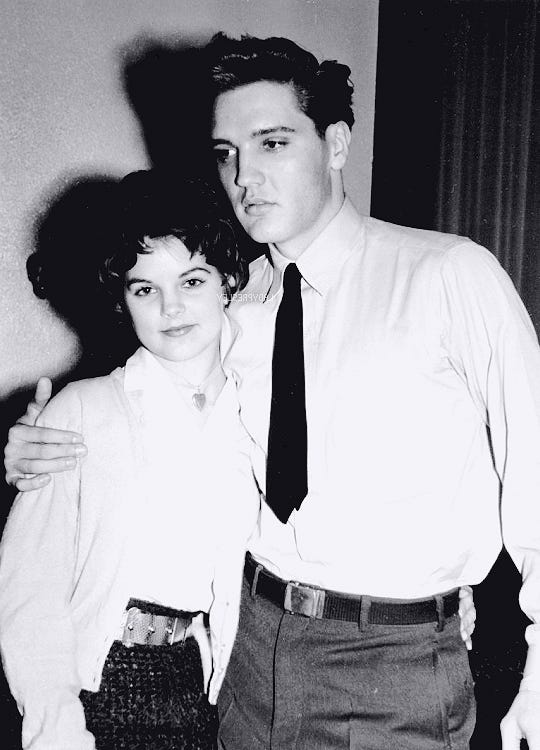
Despite this, and other accurate depictions of Elvis’ controlling, and some would say grooming behavior, Priscilla needed everyone to know that he was not a bad guy. She was just older than her years! And they did not have sex! He just talked and she listened! At one screening at the Venice Film Festival, Priscilla defended him as the love of her life. She was honored the film was made drawing on her memoir, but seemed surprised that a story of a 24-year old man who meets a 14-year-old girl and then trains her to be his ideal girlfriend and later wife is . . . . off-putting? She, like Linda Thompson and Ginger Alden, wants to preserve his reputation, even in death. They all emphasize his generosity, his goodness, how much he loved his mother, etc. However, to sell the memoirs I read, they also likely had to promise to be candid about life behind the scenes with Elvis. Priscilla herself admitted it was his “lifestyle” that she could ultimately not keep up with, of which his reading was a part. In both memoirs by Linda and Ginger, I was surprised to learn just how much Elvis’ reading figured in his life. Specifically, it was his number one seduction technique.
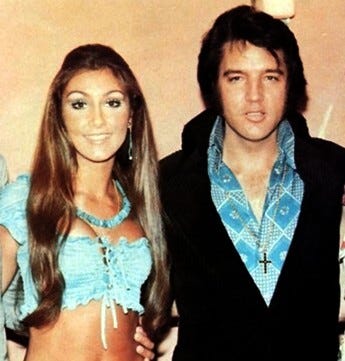
Elvis met Linda in 1972 at a movie theater and invited her to Graceland. In her memoir, she describes their first time alone together:
“Every so often, we’d stop kissing, and he’d show me some detail of his room. He had books on philosophy and spirituality stacked all around, including the Bible, of course, but also Paramahansa Yogananda’s Autobiography of a Yogi, and even books by Karl Marx, who had famously said, “Religion is the opium of the people.”
Looking back, Linda assigned meaning to Elvis’ deep reading despite his success.”I found it fascinating and wonderful that here was a man who was sitting on the pinnacle of success, and he still wanted to know what it all meant, and where he fit in, and what good he could do in the world,” she wrote. “I think about it all the time,” she quotes Elvis as saying, “‘What God wants me to do. I can’t help but wonder why God put me here. Why he gave me the talent to sing and entertain people? Why me, Lord? For those to whom much has been given, much is expected. . . I know I am supposed to give all that I humanly can to repay my maker and for blessing me with all that he has.”
This feels like a very humble and selfless explanation of Elvis’ spiritual questions and self-improvement streak. He wanted to understand how to navigate the life he’d been handed. Highly relatable content. And yet, she shares other anecdotes that suggest another reading.
Caught in a Trap: When Self-Help Becomes Self-Delusion
Dating Elvis would basically be my nightmare. The books I’ve read describe a routine that is for night owls only (I’d be okay with that), totally unpredictable (not okay with that), and totally defined by Elvis’ whims (hard pass). These women couldn’t have jobs because Elvis may want to fly to Vegas with no warning to stay in a hotel for 2 days (never leave the room) and then return to Memphis. Or, he may want to fly to Colorado one night just for one really good fried peanut butter and jelly sandwich. And you also have to be ready to stay up reading books on numerology, or meditation, or astrology to Elvis for hours on end because he struggled with sleep. Then, when he gets a packet of meds delivered to “help with sleep,” you may not ask questions. Sound good? With Ginger Alden, his last girlfriend, he once decided to visit her family at 12:30 at night, wake them all up, and order McDonald's so he could talk to her mom about the bible. He ended the night by asking if he could write some thoughts and readings into their book, one of which included the idea that “history is really His Story, aka God’s.” Apart from questions only a youth pastor would attempt, Elvis also engaged in a lot of love bombing. He’d talk about marriage very early in the relationship and signal he was serious by comparing his girlfriends to his dead mother. One of his nicknames for Linda was “Mommy.” (red flag).
But if his reading was about helping him cope with being Elvis, and to help him navigate the path God gave him, he also used the books to cosign his own less-than-holy behavior. After 18 months together during which they’d spent little time apart, Elvis drew on his book collection to justify time away from Linda to presumably see other women. ““Like . . . The Prophet, says about marriage, ‘Let there be spaces in your togetherness, stand together yet not too near together;” he told her. “For the pillars of the temple stand apart.’ Sweetheart, you know by now how much I love you and you should feel absolutely secure in that. That is not going to change. I love you.” Cut to Elvis cheating on Linda. “Elvis was smooth when he needed to be,” Linda recalled, “and he had a quote for just about every occasion or circumstance.”
Indeed, Elvis’ reading may have filled a void in his life or helped him navigate it, but it also appeared to fuel his delusions and worst impulses.
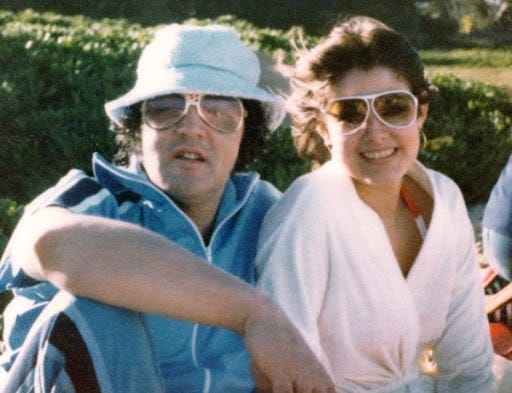
Linda eventually broke up with Elvis when she tired of his addictions and his controlling behavior. His next girlfriend, Ginger, described a lot of the same issues. She, too, had her first date in his bedroom reading self-help books. He also hid his drug use and drew on quotations from his books to defend or empower his bad behavior. By then, he was stealing sleeping pills from his dentist’s office and had memorized the Physician’s Desk Reference with its illustrations of drugs so he could catch any well-meaning attempt to feed him placebos. As with Linda, he also had tantrums and even shot a gun in Ginger’s direction when she refused to get him more yogurt out of concern for what she perceived as overeating.
Surrounded by people who were on his payroll, few would tell him no. In this environment, his books offered less a mirror than a shield. They offered him language to explain his addiction, his choices, and even shore up a belief in his divine favor. His books fueled his belief that he could heal others, for example. Ginger describes him healing her nausea and her sister’s leg injury through mind healing with Larry Gellar, for example. On a trip to Hawaii, he told Ginger he could move the clouds in the sky simply by waving his hands. This is a man deeply lost in his own delusion and addiction, but also one who believed that he was getting the intended lessons from books designed to educate, comfort, and heal.
Self-Help Can’t Fix Everything
Bibliotherapy is the use of therapeutic reading and has a long history that I’ve been interested in for years. My interest is driven in part by the power this approach invests in books to either harm or heal, depending on application. Many modern iterations of bibliotherapy exclusively focus on self-help literature as a way to educate readers about their health issues or life concerns without the possible misreadings offered by something as subjective as fiction. One program in the UK allows doctors to “prescribe” pamphlets on anxiety and depression for patients to pick up at local libraries, for example. Yet, as Elvis’ life shows us, books can harm if read by someone who is not reading them, to quote The Bachelor, “for the right reasons.” Significantly, they should never be the sole support for someone’s health or the only medicine prescribed. Elvis needed a lot of help, especially from someone willing to tell him no and hold up a mirror to the things that were no longer serving him. His own doctor prescribed him pills, even knowing his addiction, and had his license suspended after Elvis’ death.
Everyone knows Elvis died in the bathroom. What is less known is that he died reading. That day he was reading a book on the shroud of Turin called A Scientific Search for the Face of Jesus by Frank Adams and Beey Bethard’s Sex and Psychic Energy (what a combo!) People have made much of the King dying on the throne, but those metaphors don’t go far with me ( and not just because I don’t like scatological content). I think erasing the books from the story of his death robs us of seeing the complexity of his story. Here was a man who desperately needed help, who was addicted to self-help books, and yet was unable to accept any form of meaningful support. What do we do with that?
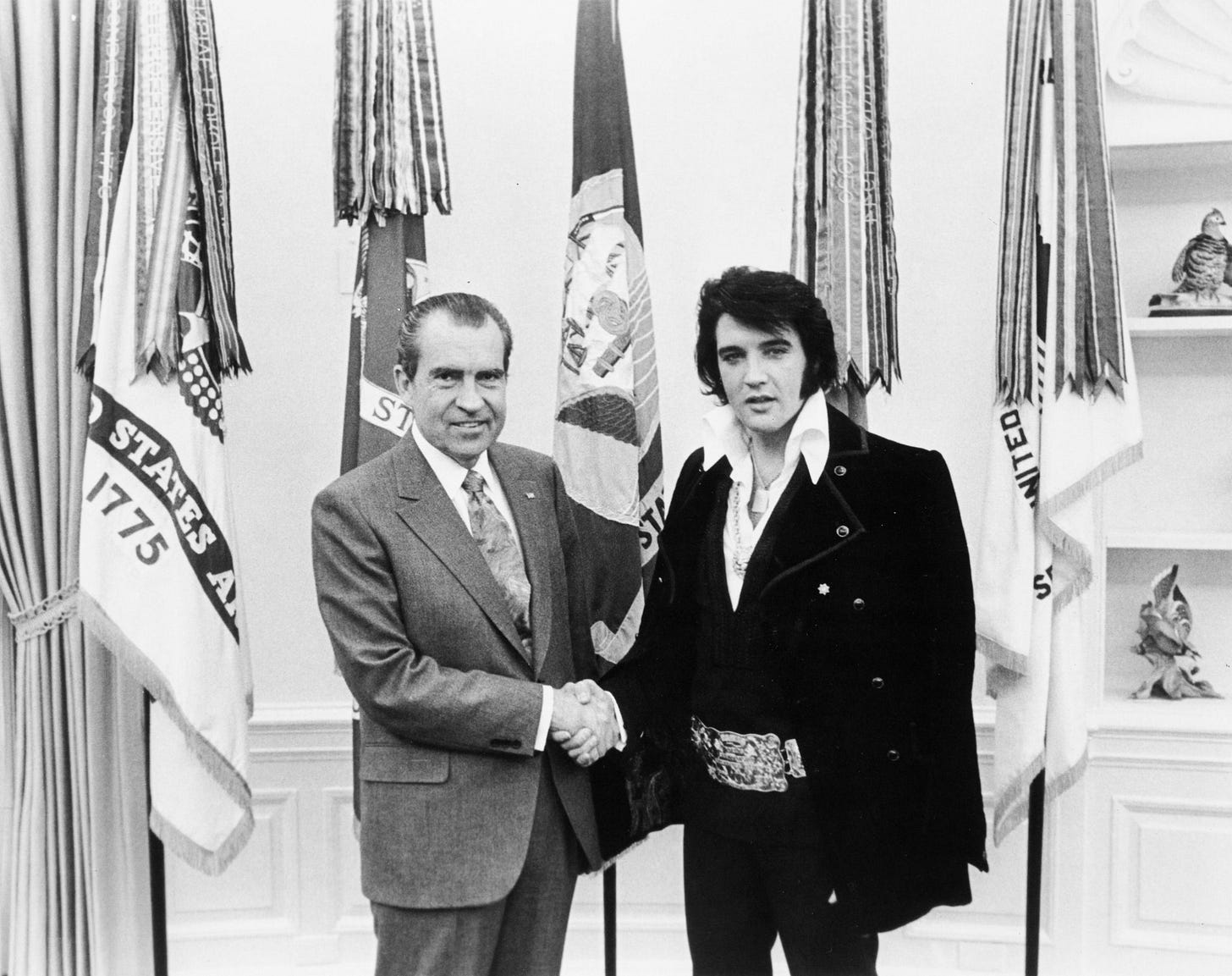
His books allowed him to live with the contradiction of his life; he was a public figure who had been celebrated publicly for talking about the evils of drugs and was also privately addicted to them for his entire adult life. This makes him sound like a con man, a guy so nefarious he drew on religious and philosophical texts for a language to pull one over on everyone in his life. I don’t think he was that calculating. I just think people are that complex. He may have genuinely believed he was on a path to spiritual growth and self-improvement, deluded himself by the stories he spun to control his relationships to people and pills. In a piece in the Village Voice not long after Elvis died, Lester Bangs described the 70s as being defined by selfishness, or solipsism, saying “Elvis may have been the greatest solipsist of all.” He was certainly focused on himself, and we will never know exactly who he was or what drove a life defined by both incredible success and tragedy.
In a recent memoir by Lisa Marie Presley, completed and amended beautifully by her daughter Riley Keough, Riley reflects on visiting Graceland as a child and staying in a family home that is also a museum. She notes the strangeness of hiding out upstairs during tours, waiting for the public to leave so they could move freely in the house. There, looking around the bedroom of the grandfather she never knew, she explored his books and read the writings he left in the margins. I can’t imagine the surreal feeling of knowing your grandfather was Elvis, and looking for some trace of who he was in the margins of his books. I wonder if reading his writing helped her know something of the man she never met, or of the woman who raised her through a cloud of grief. In completing her mother’s book and offering her own experiences, I am reminded that writing and reading can both be therapeutic. When I read this book, I felt like I was reading the work of someone who had gotten some help to process a turbulent childhood and the grief of losing a mother and sibling. I wondered if completing her mother’s book was part of that healing process, including writing openly about her own experiences. She writes with such beautiful self-awareness that I could not help but reflect on its absence in the life and writing of her grandfather. Self-help can’t work without self-awareness (and supplemental support). I wonder if the inheritance she received from him was not solely a talent for performance, but the capacity to go beyond the act and find actual healing by mining the parts of ourselves needing help and asking for it.
Call Me! (or not!)
I’d love to hear from you! Drop your thoughts in the comments to share with the Landline community, or reply to this email to contact me. You can also find me on Instagram, or email me. I don’t have a dedicated phone line yet (just like in my youth), but maybe someday I’ll achieve Claudia status and get a Landline.
Thanks for reading!
This is a free post for subscribers of Landline. Consider subscribing to the paid plan to get my weekly email of recommendations and links, a podcast episode, and more! You can also help me spread the word by sharing it with a friend who would love it. Thank you for being a friend!
Note: All books referenced in Landline can be found in my bookshop.org storefront from which I earn a small percentage of all books purchased.





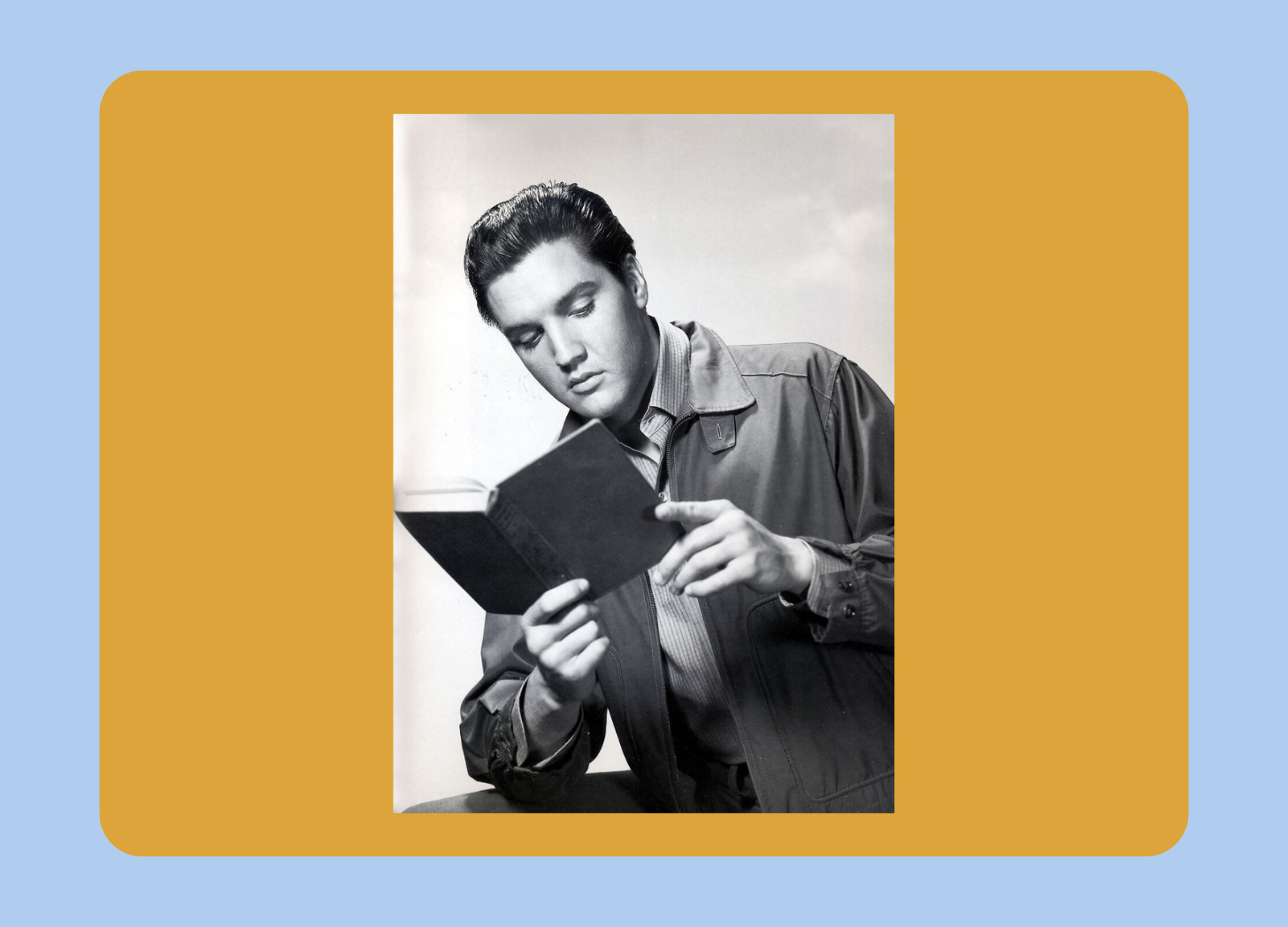
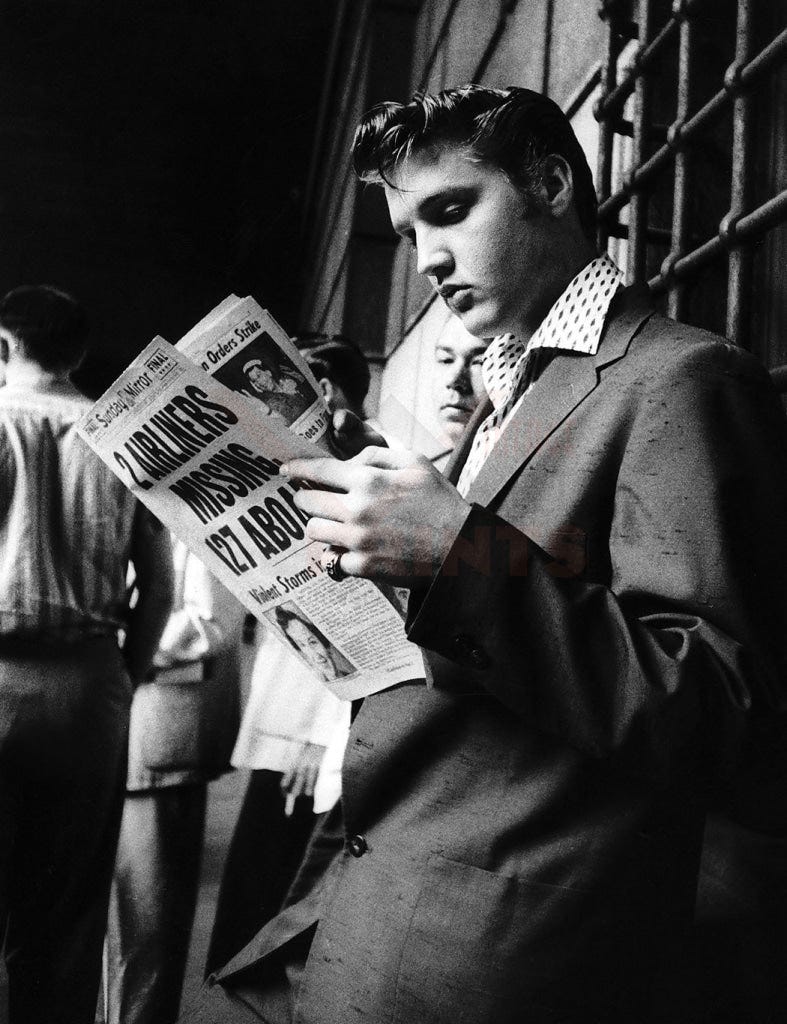
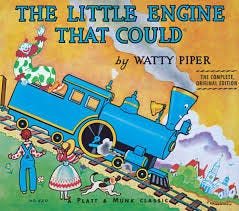
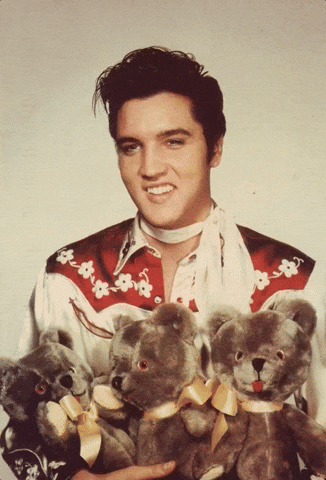

Loved this!! I requested more content on bibliotherapy and pop music in your 2025 survey—you really read my mind with this one 😊